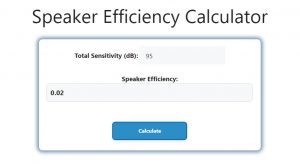About Speaker Efficiency Calculator (Formula)
The Speaker Efficiency Calculator is a vital tool for audio enthusiasts, musicians, and sound engineers. It helps in determining the efficiency of speakers, which is crucial for optimizing sound systems. Speaker efficiency indicates how effectively a speaker converts electrical power into sound output. Understanding this metric allows users to make informed decisions about speaker selection, amplifier pairing, and overall audio performance. By calculating speaker efficiency, you can enhance your listening experience and ensure that your audio equipment operates at its best.
Formula
The formula for calculating speaker efficiency is:
Speaker Efficiency (Es) = 10 ^ [(S – 112) / 10].
In this formula, ‘S’ represents the sound pressure level measured in decibels (dB) at a distance of 1 meter.
How to Use
Using the Speaker Efficiency Calculator is straightforward:
- Measure Sound Pressure Level: Start by measuring the sound pressure level of the speaker at a distance of 1 meter. This is usually done using a sound level meter.
- Input the Value: Enter the measured sound pressure level (S) into the calculator.
- Calculate Efficiency: Click the “Calculate” button to determine the speaker efficiency (Es).
- Interpret Results: Analyze the results to understand how efficient your speaker is and how it may perform in different audio settings.
Example
Suppose you have a speaker that measures a sound pressure level of 95 dB at 1 meter. To calculate the speaker efficiency:
Es = 10 ^ [(95 – 112) / 10] = 10 ^ [-1.7] ≈ 0.01995.
This means the speaker efficiency is approximately 1.995%, indicating how effectively it converts power into sound.

FAQs
1. What is speaker efficiency?
Speaker efficiency refers to how well a speaker converts electrical power into sound output, measured in decibels (dB).
2. Why is speaker efficiency important?
It helps in assessing how much power a speaker requires to produce a certain sound level, affecting overall audio performance.
3. How is speaker efficiency measured?
Speaker efficiency is typically measured using the sound pressure level (SPL) at a distance of 1 meter from the speaker.
4. What does a higher speaker efficiency mean?
A higher speaker efficiency indicates that the speaker can produce more sound with less power, making it more effective.
5. Can I improve speaker efficiency?
While you cannot change a speaker’s inherent efficiency, you can optimize your setup by using appropriate amplifiers and speaker placements.
6. What factors influence speaker efficiency?
Factors include the speaker design, materials used, and the size of the speaker driver.
7. Is there a standard efficiency rating for speakers?
There is no universal standard, but common efficiency ratings range from 80 dB to over 100 dB.
8. How does impedance affect speaker efficiency?
Impedance can affect how much power a speaker draws from an amplifier, influencing overall efficiency.
9. Can two speakers have the same SPL but different efficiencies?
Yes, two speakers can produce the same SPL at a distance but have different efficiencies based on their design and power handling.
10. What role does the enclosure play in speaker efficiency?
The type of enclosure can enhance or diminish a speaker’s efficiency by affecting sound wave propagation and resonance.
11. How can I find the efficiency rating of a speaker?
Manufacturers usually provide efficiency ratings in the speaker specifications.
12. Does efficiency affect sound quality?
Efficiency primarily affects volume levels; however, overall sound quality is influenced by other factors like frequency response and distortion.
13. Can speaker efficiency change over time?
Yes, due to wear and tear or damage, a speaker’s efficiency can decline over time.
14. What is the ideal efficiency for home speakers?
Ideally, home speakers should have an efficiency of at least 85 dB to ensure adequate sound output with most amplifiers.
15. How does speaker placement affect efficiency?
Proper placement can enhance perceived efficiency by optimizing sound propagation and minimizing reflections.
16. What is the relationship between speaker efficiency and amplifier power?
Higher efficiency speakers require less power to achieve the same volume levels compared to lower efficiency speakers.
17. Can outdoor speakers have different efficiency ratings than indoor speakers?
Yes, outdoor speakers may have different efficiency ratings due to environmental factors affecting sound projection.
18. How can I test speaker efficiency at home?
You can use a sound level meter to measure the SPL at a distance of 1 meter from the speaker while playing a reference tone.
19. Is there a maximum efficiency rating for speakers?
While there is no strict maximum, typical efficiency ratings rarely exceed 100 dB due to physical limitations.
20. How often should I evaluate speaker efficiency?
It’s a good idea to evaluate speaker efficiency whenever you upgrade your audio equipment or change your sound system setup.
Conclusion
The Speaker Efficiency Calculator is an essential tool for anyone serious about audio performance. By calculating speaker efficiency, users can gain valuable insights into their sound systems, helping them make informed decisions for upgrades and optimizations. Whether you are setting up a home theater, designing a sound system for a venue, or simply enhancing your listening experience, understanding speaker efficiency is crucial for achieving the best possible sound.
